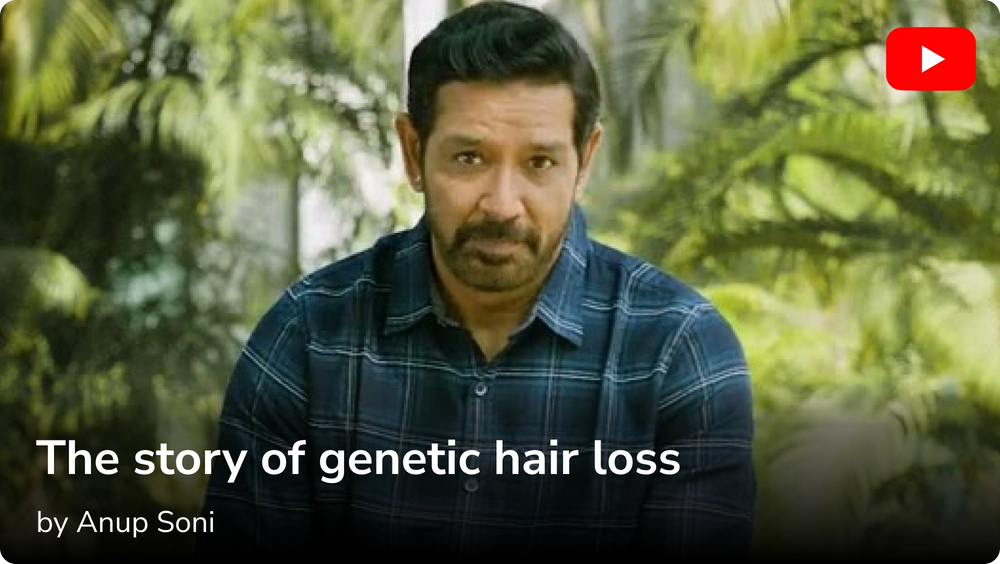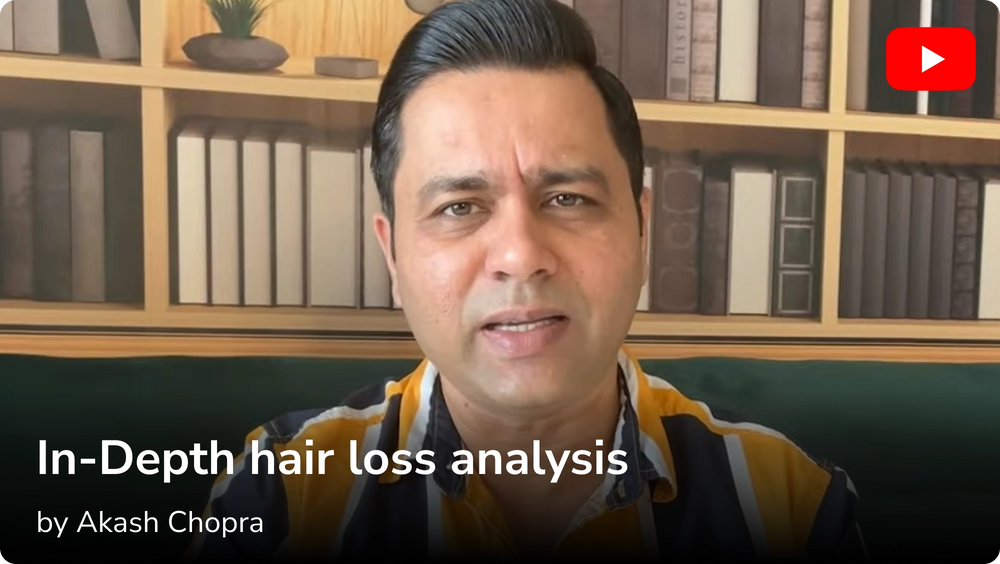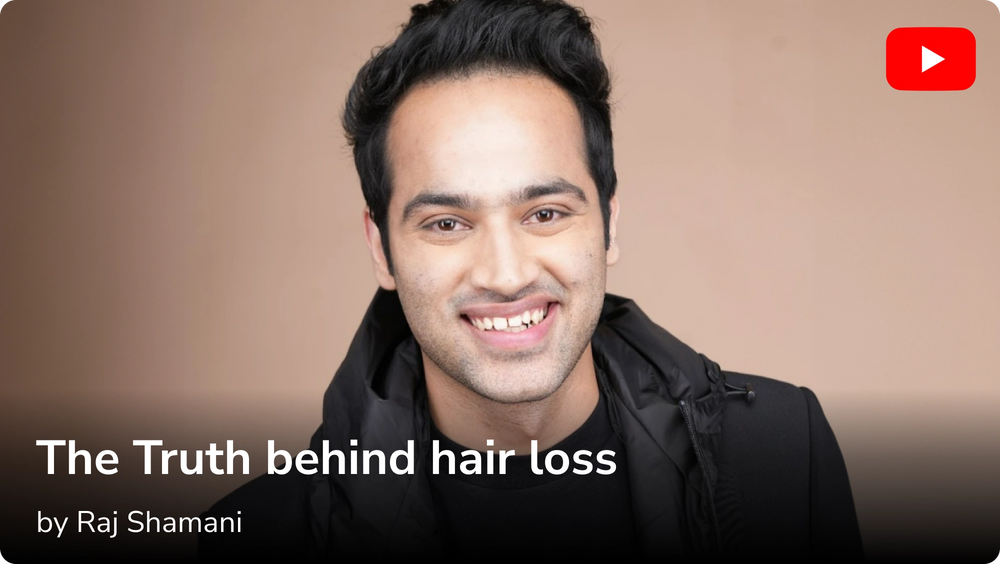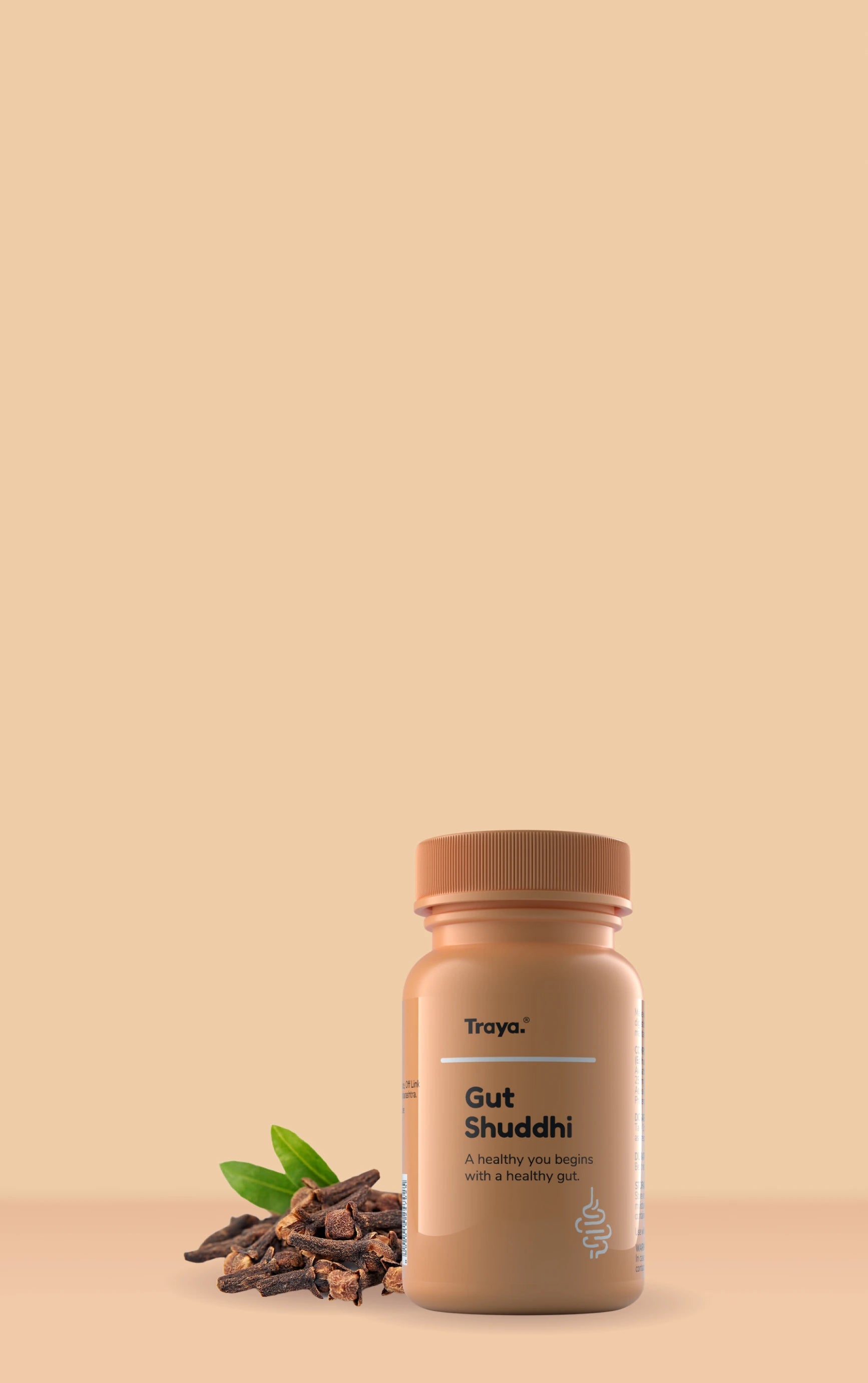Let's tackle our hair struggles together.
Hair Fall Queries?
Join our community to get answers to all your hair queries by certified hair coaches.
JOIN THE GROUPPlease download Telegram to become part of our community
Your cart(0)
Your cart is currently empty.
Your cart(0)

Air, water and the kind of food we eat, all of it impacts hair.
High stress levels can disrupt the hair cycle, leading to excess hair fall
Natural body imbalances can lead to thinning and increased hair fall
When your body isn’t functioning at its best, hair can become dry, weak, and prone to breakage
A diet lacking essential nutrients can slow down hair growth
TRAYA’S HOLISTIC PLAN FOR HAIR FALL
Our approach combines the goodness of three sciences. With ingredients from the most authentic sources, we personalize your solutions delivering assured results.
Take The Hair TestJoin us to break the hair loss myths and get the right information out.





Let's tackle our hair struggles together.
Please download Telegram to become part of our community


TRAYA 2X2 REGIMEN
Google Reviews
Most people focus on hair care—choosing the right shampoo, applying oils, and trying hair masks. But healthy hair starts at the scalp. Think of your scalp as the soil where your hair grows. If the scalp is unhealthy—whether it’s too dry, too oily, or inflamed—it affects your hair's strength, thickness, and overall health.
A healthy scalp is one that is well-balanced, properly hydrated, and free from buildup or irritation. It produces just the right amount of oil to nourish hair while maintaining a clean, breathable environment for hair follicles.
When the scalp is unhealthy, it disrupts the hair growth cycle, leading to weaker strands, increased shedding, and slow regrowth. Many overlook their scalp health until they notice excessive dandruff, itching, or hair fall.
Your scalp is home to thousands of hair follicles, each responsible for growing new hair. When the scalp is in good condition, these follicles remain active and support strong hair growth.
However, when scalp health is compromised, it can lead to:
This is why focusing only on hair strands without addressing scalp health can lead to disappointing results. Even the best hair care routine won’t be enough to prevent hair loss if your scalp isn't functioning properly.
Your scalp often shows warning signs before hair loss becomes noticeable. Here are some key indicators that your scalp might not be in its best condition:
Ignoring these signs can lead to long-term scalp damage and significant hair thinning over time.
Blood circulation is crucial in delivering oxygen and nutrients to your hair follicles. When circulation is strong, the follicles receive everything they need to stay healthy and continue producing new hair. But when circulation is poor, hair growth slows down, and follicles may enter a dormant state, leading to thinning and hair loss.
Factors that reduce blood flow to the scalp include:
Improving scalp circulation can enhance hair growth naturally. Simple practices like scalp massages, inversion therapy, and a diet rich in iron and omega-3s can help boost blood flow and nourish hair follicles effectively.
Your scalp is the foundation of healthy hair, but when it’s not in balance, it can lead to persistent issues like dryness, oiliness, itching, flaking, or even hair loss. Many of these problems start subtly, with mild irritation or discomfort, and gradually worsen over time. Identifying your specific scalp condition is the first step toward restoring its health.
One of the biggest mistakes people make is using the wrong hair care routine for their scalp type. A dry scalp needs hydration, while an oily scalp needs oil regulation. Treating them incorrectly can worsen the problem.]
Flaky scalp and dandruff are often confused, but they have different causes.
If stubborn flakes don’t go away with moisturising, it could be dandruff rather than just a dry scalp. Identifying whether your flakes are due to dehydration or fungal overgrowth is crucial for effective treatment.
An itchy scalp is more than just a temporary discomfort. Persistent scalp irritation can weaken hair follicles, leading to increased hair shedding.
If you experience excessive itching and noticeable hair thinning, it’s important to address the root cause rather than just using anti-itch products.
A scalp that feels sore, tender, or has a burning sensation isn’t normal. These sensations often indicate underlying inflammation, nerve sensitivity, or circulatory issues affecting hair growth.
If scalp discomfort persists or is accompanied by hair loss, it’s a sign of an underlying issue that needs expert assessment.
Scalp acne occurs when hair follicles become clogged with oil, dead skin cells, and bacteria. Unlike regular acne, scalp pimples can be painful because of the area's dense network of nerve endings.
If scalp acne is persistent, a specialised scalp treatment plan may be required to address the root cause.
Alopecia refers to hair loss conditions due to genetic, hormonal, or scalp-related factors.
Since hair loss linked to scalp health can often be reversed, early diagnosis and a personalised treatment plan can help restore hair growth.
Chronic scalp inflammation damages the hair follicle environment, making it harder for hair to grow back. Conditions like seborrheic dermatitis, psoriasis, and allergic reactions cause continuous irritation, leading to thinning hair and reduced scalp coverage.
If your scalp feels constantly irritated or inflamed, getting a professional assessment is essential to prevent long-term follicle damage.
Many people focus on strengthening their hair without realising that hair health starts at the scalp. A well-balanced scalp creates the right environment for hair to grow thick and strong, while an unhealthy scalp can lead to weak, thinning hair that falls out easily. Understanding how your scalp affects hair growth is the first step toward preventing hair loss and promoting long-term hair health.
Hair growth happens in cycles, and each strand goes through growth, rest, and shedding phases. A healthy scalp ensures that hair stays in the growth phase longer, producing thicker, stronger strands.
If the scalp is inflamed, excessively oily, or suffering from an underlying condition, it disrupts the hair cycle. This can lead to premature shedding, slow regrowth, and weaker strands that break easily. A healthy scalp provides the right balance of natural oils, circulation, and follicle nourishment to keep hair anchored and growing at its best.
Some of the key factors that influence scalp health include:
Ignoring scalp health often results in gradual hair thinning, which many people overlook until significant hair loss has already occurred.
Sebum, the natural oil the scalp produces, is essential for keeping hair hydrated. However, when the scalp produces too much oil, it can mix with dead skin cells and environmental impurities, creating a layer of buildup that clogs hair follicles.
Clogged follicles prevent new hair from growing properly, leading to slow regrowth and thinning. Excess sebum also creates the perfect environment for fungal overgrowth and scalp acne, further weakening hair follicles.
Common signs that scalp buildup is affecting hair growth include:
Maintaining a clean scalp without overwashing is key to keeping follicles clear and healthy. Finding the right balance between cleansing and scalp nourishment is crucial for long-term hair growth.
Scalp infections are a hidden cause of hair loss that many people overlook. Fungal infections like dandruff and seborrheic dermatitis, bacterial overgrowth, and conditions like folliculitis can weaken the hair roots, leading to increased shedding.
Fungal infections occur when the scalp’s microbiome imbalances, allowing harmful fungi like Malassezia to multiply. This leads to inflammation, flaking, and irritation, which disrupt the hair follicle’s ability to produce healthy strands.
Bacterial infections, often caused by poor hygiene, excessive oil production, or clogged pores, can cause scalp acne, redness, and tenderness. Left untreated, they can damage the hair follicles, leading to patchy hair loss.
Recognising and treating these infections early is key to preventing long-term damage to the scalp and hair follicles.
Hair follicles rely on a steady supply of oxygen and nutrients to remain active and produce healthy hair. Blood circulation in the scalp plays a direct role in delivering these essential nutrients to the follicles.
When circulation is poor, follicles don’t receive enough nourishment, leading to weaker hair growth and increased shedding. Scalp tension, stress, and a sedentary lifestyle can all contribute to reduced blood flow, affecting hair thickness over time.
Ways to improve scalp circulation include:
If hair loss is linked to poor circulation, improving blood flow to the scalp can make a significant difference in hair regrowth.
Not all hair loss is due to temporary factors like seasonal shedding or stress. Some scalp conditions directly impact hair follicle function, leading to bald patches and progressive thinning.
Common scalp-related causes of hair thinning include:
Addressing these early scalp conditions can help slow hair loss and support healthier regrowth.
Scalp issues don’t appear overnight. They often develop due to underlying imbalances that affect hair follicles and disrupt the scalp’s ability to maintain healthy hair growth. Whether it’s persistent dandruff, excessive oil production, or sudden hair thinning, identifying the root cause is the key to finding the right solution.
The scalp has a natural balance of bacteria and fungi that help maintain a healthy environment for hair growth. However, when this balance is disrupted, certain fungi, like Malassezia, can grow uncontrollably and lead to dandruff, itching, and inflammation.
Fungal infections on the scalp often cause:
When the scalp’s microbiome is out of balance, the hair follicles don’t get the support they need to produce strong, healthy hair. Treating scalp fungal infections early can prevent further damage and help restore the scalp’s natural equilibrium.
Both seborrheic dermatitis and psoriasis can cause scalp flaking, but they are very different.
An overgrowth of Malassezia fungus and excess oil production causes seborrheic dermatitis. It leads to:
On the other hand, Psoriasis is an autoimmune condition that causes the skin to produce cells too quickly, leading to thick, scaly patches. It often presents as:
While seborrheic dermatitis responds well to antifungal treatments, psoriasis requires specialised care to manage inflammation and slow skin cell turnover.
Your diet plays a major role in scalp health. The scalp can become dry, inflamed, or prone to excessive oil production without the right nutrients. Some of the most common deficiencies that impact scalp health include:
A nutrient-rich diet is essential for maintaining a healthy scalp. If the body lacks key vitamins and minerals, it affects both scalp condition and hair density.
Stress isn’t just bad for mental health—it directly impacts the scalp and hair follicles. When stress levels rise, the body produces more cortisol, which can:
Chronic stress can also lead to scalp tension, restricting blood flow and reducing the amount of nutrients reaching hair follicles. Over time, this weakens the roots and makes hair more prone to falling out. Managing stress through relaxation techniques, exercise, and proper scalp care can help maintain a balanced scalp environment.
Hormones are crucial in regulating scalp oil production, follicle activity, and hair growth. When certain hormones become imbalanced, it can lead to scalp problems and hair loss.
Since hormonal imbalances often go unnoticed until they start affecting hair, identifying them early is key to maintaining a healthy scalp.
Maintaining a healthy scalp is not just about choosing the right shampoo. It requires a combination of proper cleansing, nourishment, and care to ensure that hair follicles remain active and produce strong, healthy hair. A well-maintained scalp provides the right environment for long-term hair growth while neglecting it can lead to issues like dandruff, buildup, and thinning hair.
Every scalp is different, and what works for one person may not be suitable for another. A scalp care routine should be based on whether the scalp is dry, oily, or balanced. Using the wrong hair care products can worsen scalp conditions and affect hair growth.
Maintaining a consistent scalp care routine helps regulate oil production, keeps the scalp clean, and supports healthy hair regrowth.
Scalp massage is one of the simplest and most effective ways to improve hair growth. Massaging the scalp stimulates blood circulation, which helps deliver oxygen and nutrients to hair follicles. This increased blood flow strengthens hair roots, promotes thicker strands, and encourages dormant follicles to become active.
Benefits of regular scalp massage include:
Massaging the scalp for just a few minutes daily using fingertips or a scalp massager can make a noticeable difference in hair health over time.
Overwashing or using harsh shampoos can strip away the scalp’s natural oils, leading to excessive dryness or forcing the scalp to produce even more oil to compensate. On the other hand, not washing often enough can result in buildup, clogged follicles, and scalp irritation.
For a balanced approach:
Proper scalp cleansing prevents product buildup and ensures that follicles remain clear for optimal hair growth.
Ayurveda emphasises the importance of maintaining a healthy scalp environment by balancing natural oils and preventing inflammation. Based on Ayurvedic principles, different scalp types require different care approaches.
Natural ingredients that align with the body’s needs helps maintain a healthy scalp without relying on chemical-heavy products.
A dehydrated scalp can become flaky and irritated, while lacking essential nutrients can weaken hair follicles. Scalp health is directly linked to overall hydration and diet.
To keep the scalp in its best condition:
A well-balanced diet provides the necessary vitamins and minerals for strong, healthy hair growth.
Using too many styling products, dry shampoos, and heavy oils can cause product buildup on the scalp, which clogs hair follicles and affects hair growth. This buildup can also trap dirt and bacteria, leading to scalp irritation and dandruff.
To prevent product buildup:
Keeping the scalp clean and free from excessive product accumulation allows hair follicles to function properly and support strong hair growth.
Many scalp issues can be managed with the right care, but some symptoms indicate a deeper problem that needs attention. If you’re experiencing persistent discomfort, sudden changes in hair thickness, or ongoing scalp conditions that don’t improve with regular care, it’s a sign that your scalp health needs to be assessed. Identifying the root cause early can prevent long-term hair thinning and scalp damage.
Occasional itching is normal, but if your scalp feels constantly irritated, it could indicate an underlying issue. Persistent itching often comes with redness, burning, or even a tight sensation on the scalp. This could be caused by fungal overgrowth, product buildup, allergic reactions, or scalp inflammation. If left untreated, ongoing irritation weakens hair follicles, leading to increased shedding and slow regrowth.
A scalp that burns or stings after using hair care products may also be reacting to harsh ingredients like sulfates, parabens, or artificial fragrances. If these symptoms don’t subside with mild, soothing scalp treatments, a deeper assessment is needed.
A healthy scalp should not feel painful to touch. If you experience discomfort when moving your fingers through your hair or feel soreness at the roots, it could be due to inflammation, tension, or restricted blood circulation.
Common causes of scalp tenderness include:
Scalp pain that persists for weeks without improvement could be a sign of deeper inflammation, requiring a professional assessment.
Shedding between 50 to 100 strands of hair daily is normal, but if you notice excessive hair fall, it’s important to find out why. When the scalp is unhealthy, hair follicles weaken, leading to premature shedding. If your scalp is becoming more visible through your hair, it could be due to follicle miniaturisation, where the hair becomes thinner over time.
Scalp-related hair loss may be triggered by factors such as:
Early signs of thinning, such as widening hair parting or increased shedding when washing or brushing, should not be ignored.
Excess scalp oil can create the perfect environment for dandruff and fungal overgrowth. If your scalp remains greasy even after washing or if dandruff keeps returning despite using anti-dandruff shampoos, it could indicate an underlying imbalance.
Oily scalp conditions may result from:
An excessively oily scalp can also lead to scalp acne and inflammation, affecting hair growth over time.
If your scalp has rough, dry patches that persist despite moisturising, it may not just be normal dryness. Conditions like scalp psoriasis, seborrheic dermatitis, or eczema can cause thick, scaly buildup that doesn’t go away with standard hair care routines.
Signs that a dry, flaky scalp requires deeper assessment include:
If dry patches remain for weeks or spread to other parts of the scalp, a professional evaluation is needed to determine the cause.
Scalp problems often persist because they are treated with temporary solutions rather than addressing the root cause. Many people try different shampoos, home remedies, or oils, only to find that their dandruff, itching, or hair thinning keeps returning. That’s because scalp issues are not the same for everyone. The right treatment depends on understanding your scalp type, oil balance, and any underlying conditions affecting your hair growth.
Every scalp is unique. Some people struggle with excessive oil production, while others deal with chronic dryness. Some have fungal overgrowth, while others experience inflammation or circulation issues. The same treatment that works for one person may not work for another.
A generic anti-dandruff shampoo or a random hair oil may provide short-term relief, but without identifying what is actually causing the problem, the issue will return. That’s why understanding your scalp health is the first step toward long-term hair improvement.
The Traya Hair Test is designed to analyse your scalp’s specific condition and provide a treatment plan that works for you. It identifies:
This scientific approach ensures that instead of guessing or experimenting with different products, you get a scalp care routine that directly addresses your concerns.
Traya’s approach to scalp care is rooted in three sciences: Ayurveda, Dermatology, and Nutrition. This combination ensures that all aspects of scalp health are considered, leading to a more effective and long-lasting solution.
By combining these sciences, Traya creates a treatment plan that is effective and personalised to your specific needs.
A well-designed scalp treatment plan goes beyond just cleansing or applying oils. It includes:
A targeted approach can resolve scalp issues at the root, leading to healthier hair regrowth and long-term scalp balance.
Scalp health is the foundation of strong, thick hair. Ignoring persistent scalp problems can lead to gradual thinning, increased shedding, and long-term hair loss. Addressing these issues early ensures that hair follicles remain active and capable of producing new, healthy strands.
A well-balanced scalp leads to healthier, stronger, and thicker hair. If left untreated, common scalp problems can progress into more severe conditions, making regrowth more difficult. Instead of trying random solutions, the best approach is to identify the exact reason behind your scalp concerns.
Take the Traya Hair Test today to get expert-backed insights into your scalp health and a personalised solution for long-term hair improvement.
The claims and results mentioned are based on multiple internal studies and customer research surveys that Traya has conducted with a statistically significant sample size of users who were under expert observation and guidance
93% saw results*
Traya conducted an internal study over both men and females facing hair fall and 93% saw results* after using the complete Traya solutions consistently for a period of 5 months. This study was conducted in December 2022.
Money back Guarantee
Traya’s 100% money back guarantee is valid only if you have been regular with the complete Customised plan for all consecutive months of your recommended period. Each customised hair kit is valid for only 30 days. If any individual has not seen any regrowth or control in hair fall, you can ask for a refund. However, once you apply for the money back guarantee, the team would then do a thorough check on consumer regularity based on every order date and then assign a qualified hair experts to determine eligibility . An exception to this policy is for those customers undergoing serious health conditions.
Traya’s Holistic 3 Science Formula
Traya’s 3 Science Formula is a synergistic mix of Ayurveda, modern science & Food Science designed specifically to cater to hair loss conditions stemming from multiple root causes. With lab tested ingredients and adaptogenic herbs, Traya’s Science-Backed formula clears internal blockages and boosts hair regeneration naturally. When blended with a healing dietary plan, it delivers great results in attaining long-term hair growth.
Traya Free hair test (™)
Traya’s Hair Dx test is powered by a proprietary algorithm to examine a user's hair & wellness profile. With the help of a distinctive image-capturing technique & experts- formulated examination, it is able to precisely analyze the type, stage & root causes of a certain hair loss condition.
8 lakh+ customers
Traya Free hair test (™) has been taken by more than 8 Lakh+ Customers - Data acquired from Traya customers.
Ayush Certified - Digest Boost, Cholest Vati and Consti Clear are Ayush Certified Products.
Traya’s Ayurvedic Products are based on natural and Ayurvedic formulations. These are completely safe for human use, but it is possible that certain ingredients may cause allergic reactions to some individuals.
Accurate hair diagnosis
The Traya free hair test (™) is a proprietary algorithm developed with the help of our in-house hair experts that provides Accurate hair and health diagnosis, provided you mention all the correct details about yourself. It gives a precise diagnosis about the type, stage and root cause of a specific hair fall condition.
Long Lasting Visible Hair Results
Traya’s complete "plan" gives visible and long-lasting results provided you’re on Traya’s hair maintenance kit. Since Traya works on the internal root causes of hair fall and hence our customers have seen long lasting results
Trusted by 70+ Hair Experts
Traya has been tried and loved by over 70 hair experts all over India to maintain healthy hair growth.
Award Winning Trusted Brand
India’s Healthcare Excellence initiated by Brands Impact has awarded Traya as the Most Effective Haircare Product of the Year 2022
Traya Women Santulan (™)
Traya’s Women Santulan is a unique technology that uses a combination of herbs treated in a specific manner (kalpa) to meet the bio-specific needs of women going through different stages of life. Santulan is a supplementary range to Traya’s 3 Science Formula which balances and nourishes the body inside-out delivering long-lasting hair growth results and overall health.
Hair Growth Plan starts at Rs 1699 pm* - The price mentioned is for a male of age 23 with stage 1 type hair fall based on the results of the hair test taken on the website. Prices may vary for individual customers depending on the results of the hair test and internal root causes
Hair Growth Plan starts at Rs 2000 pm* - The price mentioned is for a male of age 25 with stage 1 type hair fall based on the results of the hair test taken on the website. Prices may vary for individual customers depending on the results of the hair test and internal root causes